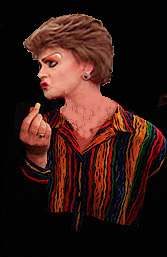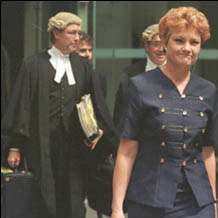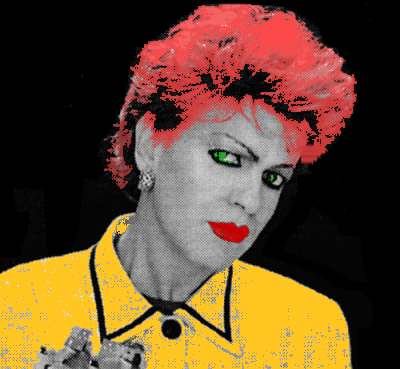[COMMUNICATIONS UPDATE] November
1998
The Perils of Pauline
by Julie Eisenberg
The continuation of the
injunction stopping the ABC from broadcasting the Pauline Pantsdown song
"Backdoor Man" has disturbing implications for free speech
Political satire isn't dead yet but it has taken
a bruising with the Queensland Court of Appeal's decision to dismiss the
ABC's appeal against the September 1997 injunction on the Pauline Pantsdown
"Backdoor Man". Heard and decided several days before the October Federal
election, the judgment will keep the song off the airwaves at least until
the trial and probably beyond, unless the ABC can successfully appeal to
the High Court.
Given that only a short time ago, Hanson's outspokenness
on sensitive issues was promoted by some as a working model of a new "free
speech", it is not hard to find the irony in her use of the courts to suppress
someone else's expression.
Since her maiden speech, Hanson has been a fertile
subject for satire. The Mambo clothing label produced a T-shirt parody
of a Redheads matches box with a Pauline Hanson head, titled "Rednecks:
Av Contents: Ignorance". Television comedy program Full Frontal regularly
screens a Hanson lookalike lambasting an articulate Asian man for not properly
pronouncing "Oz-trayun". Her policies have always been provocative. (As
we were recently reminded by Richard Ackland in the Sydney Morning Herald,
these included endorsement of "The Truth" book which alleged aboriginal
cannibalism of children).
So, it is not surprising to find Hanson occupying
a curiously analogous position to the Reverend Jerry Falwell, who was the
butt of scathing critique by Hustler magazine publisher Larry Flynt. But
there's one big difference. In the celebrated U.S. case, the Supreme Court
found that a parody of a Campari advertisement featuring Falwell describing
his "first time" with his mother in an outhouse did not defame Falwell
because readers would realise it was not to be taken seriously. The Queensland
Court of Appeal has taken the opposite approach.
Backdoor man
 "Backdoor
Man" is a cut and paste of Hanson's voice, reshaped into statements like
"I'm a backdoor man. I'm very proud of it...I'm homosexual...I'm not natural.
I'm not human" and "I'm a very caring potato". Before each ABC broadcast,
a disclaimer explained the song was "satirical and not to be taken seriously". "Backdoor
Man" is a cut and paste of Hanson's voice, reshaped into statements like
"I'm a backdoor man. I'm very proud of it...I'm homosexual...I'm not natural.
I'm not human" and "I'm a very caring potato". Before each ABC broadcast,
a disclaimer explained the song was "satirical and not to be taken seriously".
Hanson argued the song imputed she is a homosexual,
a prosti- tute, involved in unnatural sexual practices, associated (and
had anal sex) with the Ku Klux Klan, was a man and/or a transvestite and
involved in sexual activities with children.

The decision
Upholding an injunction granted in September 1987,
the Court of Appeal confirmed that the power to grant injunctions to stop
defamation should be exercised with great caution and only where the publication
was defamatory ( not just "capable" of being defamatory). If there was
room for debate about the defamatory meaning, the defendant might establish
a defence or damages would be nominal, the injunction should not be granted.
The ABC argued the "cut and paste" made it clear
to listeners that references to, say, sexuality, were not literal, but
rather "alluding in a satirical or ironic sense" to Hanson's conservative
political views. The Court of Appeal rejected this, finding there was "no
real room for debate that an ordinary sensible listener not avid for scandal
would conclude that at least one or more of these imputations arose. If
a jury were to find the opposite, I am satisfied that this Court would
on appeal set aside its verdict as unreasonable. One or more of these imputations
do arise and the are plainly defamatory for exposing the respondent to
ridicule and contempt".
The ABC's disclaimer did not "convert grossly defamatory
into acceptable material". In effect, the Court found that listeners would
have taken the song literally or colloquially.
The ABC could not rely on the Queensland qualified
privilege for a good faith publication made during "discussion of a subject
of public interest because, in the Court's view, the "major subject" of
the song was Hanson's "sexual preferences or orientation". "Derisory fun
or nonsense" would not be protected by this defence.
The injunction did not infringe the need for "free
and general discussion of public matters" fundamental to our "democratic
society" because the song and its "grossly offensive" imputations about
a member of parliament were "part of an apparently fairly mindless effort
at cheap denigration".
The implications
While the Court applied the right test of whether
or not an injunction should be granted, the way in which it was applied
to these facts is concerning.
The strong implication is that ordinary Australian
listeners (unlike Larry Flynt's American audience) can't be trusted to
pick up subtext.
The song is clearly critical of Hanson. But it is
far from "mindless". Unlike much of the overt satirism of Hanson, and despite
its sometimes "in your face" content, "Backdoor Man" is more subtle in
its underlying message: what makes it funny and scathing is the absurdity
of that voice saying those things. The internal irony is comparable to
a Beazley cut and paste of "I'm a frontrnan for anorexics anonymous" or
a mock-up of John Howard promoting the drug ecstasy. Hanson's real life
sexual preferences are not the "major subject" of the song: these words
are a device which highlight her political conservatism, clearly signposted
to listeners by phrases like "I am not human".
 "Backdoor
Man" asks listeners to distinguish between the real ("Please explain")
and the unreal ("I am not human"). It brings to mind an episode of "Wildside"
broadcast on ABC TV some months ago with a controversial Hanson-esque central
character, whose young son is used as a political pawn by her minder. The
ABC ran a disclaimer that while "inspired" by current events, characters
and incidents were fictional. They counted on viewers being sophisticated
enough to distinguish between what reflected thc real - a character strongly
based on the Hanson persona, and what was artifice - a plotline that justified
the character's inclusion in a weekly police show. While the episode probably
(and defensibly) defamed the real Hanson, it certainly did not impute that
she might be involved in a plot to kidnap her young child for political
gain. "Backdoor
Man" asks listeners to distinguish between the real ("Please explain")
and the unreal ("I am not human"). It brings to mind an episode of "Wildside"
broadcast on ABC TV some months ago with a controversial Hanson-esque central
character, whose young son is used as a political pawn by her minder. The
ABC ran a disclaimer that while "inspired" by current events, characters
and incidents were fictional. They counted on viewers being sophisticated
enough to distinguish between what reflected thc real - a character strongly
based on the Hanson persona, and what was artifice - a plotline that justified
the character's inclusion in a weekly police show. While the episode probably
(and defensibly) defamed the real Hanson, it certainly did not impute that
she might be involved in a plot to kidnap her young child for political
gain.
The decision also raises concerns about the role
of the jury in defamation cases. The Court of Appeal has made it clear
that if the trial jury doesn't interpret the song in the same way, the
court will overturn the jury's finding. Juries in defamation cases serve
as a window on how the "ordinary person" would react to a publication.
A NSW jury in Howlett v Saggers illustrated this point earlier this year
- as a threshold issue, the jury found it wasn't defamatory to say someone
was bankrupt but it was defamatory to say their mismanagement of their
affairs led to bankruptcy. This is a fine distinction which is very real
to a late 1990s audience but doesn't necessarily leap out of the pages
of legal textbooks.
 The
decision also treads awkwardly over late 1990s questions about sexual morality.
In December 1997, NSW Supreme Court judge, Justice Levine, left for determination
by a jury the question of whether or not it was defamatory to call someone
a homosexual. (CU issue 141, March 1998). In contrast, the Queensland Court
of Appeal has effectively set community standards without hearing full
argument on those issues. Publicity surrounding the injunction would surely
send a strong message to the future jury. (And, by the way, since when
was it defamatory to call someone "a man"?) The
decision also treads awkwardly over late 1990s questions about sexual morality.
In December 1997, NSW Supreme Court judge, Justice Levine, left for determination
by a jury the question of whether or not it was defamatory to call someone
a homosexual. (CU issue 141, March 1998). In contrast, the Queensland Court
of Appeal has effectively set community standards without hearing full
argument on those issues. Publicity surrounding the injunction would surely
send a strong message to the future jury. (And, by the way, since when
was it defamatory to call someone "a man"?)
The decision to grant an injunction is always a balancing
process, with free speech given a heavy weighting. During the oral argument,
Hanson's counsel said: "What's the harm in the ABC not being able to broadcast
this song. There's no detriment at all".
Whether it's the ABC or any other media providing
a platform for satire or criticism about public and political figures,
the harm in shutting out alternative voices is clear.
In the context of the level of criticism surrounding
someone
like Pauline Hanson, it is also dangerous and naive to treat an individual
song or story in isolation. Defamation law can at times be formulaic but
even leaving aside questions about the Court's interpretation of the song,
it is hard to see how a week of broadcasting "Backdoor Man" on Triple J
truly damaged her reputation. Yet, if the Court of Appeal's decision is
left to stand, the trial jury will have little to do but tally up the dollars.
< |





![]()
![]()
![]()
![]()
![]()
![]()
![]()
![]()
![]()
![]()
![]()
![]()
![]()
![]()
![]()
![]()
![]()
![]()
![]()
![]()
![]()
![]()
![]()
![]()
![]()
![]()
![]()
![]()
![]()
![]()
![]()
![]()
![]()
![]()
![]()
![]()
![]()
![]()
![]()
![]()
